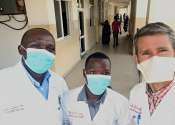Scientists map the evolution of urinary tract cancer cells
Researchers at Weill Cornell Medicine have performed the most comprehensive analysis to date of cancer of the ureters or the urine-collection cavities in the kidney, known as upper tract urothelial carcinoma (UTUC). The study, ...
Mar 18, 2024
0
19









